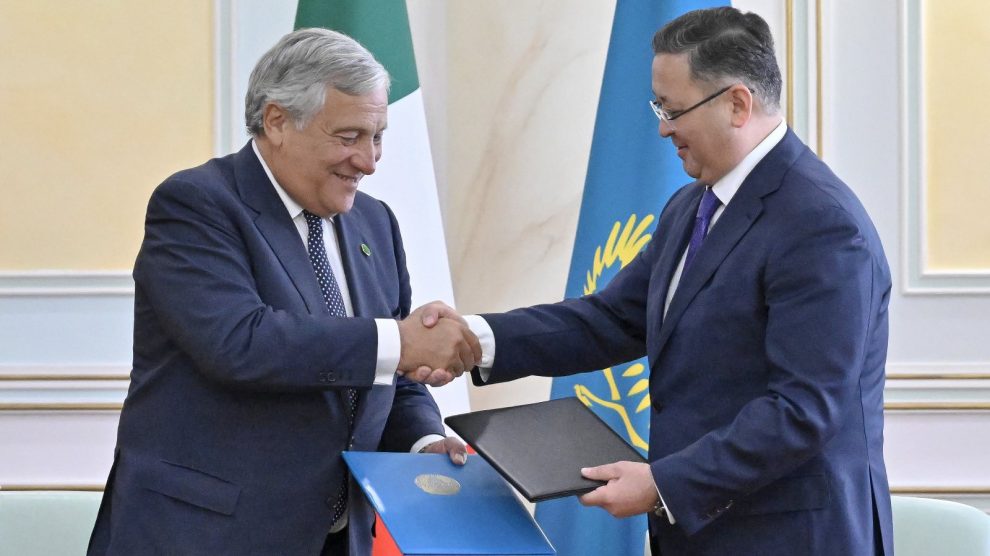The Tajani-Nurtleu meeting. On Tuesday, right after visiting China for the most delicate of missions, Italian Foreign Minister Antonio Tajani stopped in Kazakhstan. There, he met with his counterpart Murat Nurtleu, with whom he signed a memorandum of understanding – the first of its kind between Rome and Astana – centred on critical raw materials and renewables.
Italy hearts Kazakhstan… The meeting was “very positive,” remarked Minister Tajani, noting that Rome considers Astana a “strategic partner” and has established a “strong friendship” that will have “positive effects” on both countries. He then expressed Italy’s appreciation for Kazakhstan’s positions on its internal reforms – “which we support” – and the “sensitivity and moderation with which it moves on the international stage,” citing the country’s position on Ukraine and work on Afghanistan.
- The FM also announced that Italy will soon inaugurate the Italian Institute of Culture in Almaty, “demonstrating how much we believe in cultural diplomacy.”
… and the feeling is mutual. “We reiterate our interest in strengthening the global partnership and invite the Italian side to invest in the priority sectors of our economy,” Minister Nurtleu said, noting that “solid cooperation” is developing between the two countries, whose “positions on international issues are similar and close. “Considering Rome’s role in the development of energy, logistical and technological links between Central Asia and Europe, we fully support the desire to further promote mutually beneficial projects.”
- Given the “harmonious” political dialogue, “we prefer to focus first on our trade and investment partnership. Today, Italy is our main trading partner in Europe.”
Let’s get material. In FM Tajani’s words, the “marriage” between Italian industry and Kazakh raw materials “can bring excellent results for both countries.” He and FM Nurtleu, whom he invited to Rome, agree on the need to set up a business council to foster commercial ties between the two countries. The two then signed a memorandum of understanding that laid out their “mutual interest in establishing forms of cooperation” and “willingness to promote economic and industrial collaboration initiatives,” as well as “facilitate direct investments and joint ventures” in the fields of renewable energy, green hydrogen, raw materials and rare earths.
- The document outlines Rome and Astana’s intention to implement industrial pilot projects in the sectors mentioned above, leveraging existing platforms (such as the Green Hydrogen Alliance) and the Kazakh drive to support and facilitate the exchange of technological knowledge in this sector.”
- Trade and commercial ties were also central to the MoU, which envisions efforts to “facilitate the visa regime within the Schengen area for citizens of Kazakhstan.”
- Finally, the two affirmed the “mutual interest in promoting consultation and cooperation in the field of culture, education and science drawing on each other’s areas of expertise.”
A widening footprint. Rome’s efforts to consolidate its presence in Central Asia began in 2019 with the Italy-Central Asia conference featuring representatives from Kazakhstan, Kyrgyzstan, Tajikistan, Turkmenistan and Uzbekistan. PM Meloni’s executive seems intent on pursuing that push and carving out a leading regional role.
- In June, Italy struck a “strategic partnership” with Uzbekistan centred on economic development as the country – along with some other regional powers, including Kazakhstan – pushes to open up its economy to the world. It also closed a raw materials deal with Tajikistan.
- It all interlaces with the decline of Russia’s status in the region, frayed by its increasingly evident unreliability (if not outright danger it poses to the post-Soviet space) and its longer-term economic prospects as a commercial partner.
- That’s one of the reasons for countries in the region to look beyond Moscow. And that’s where Italy, which is increasingly projected eastwards, comes in.




